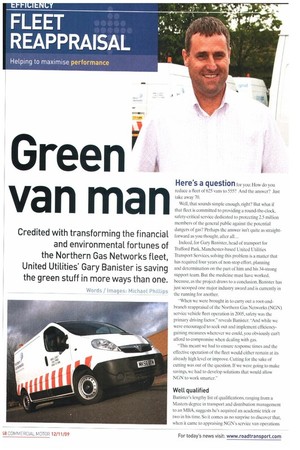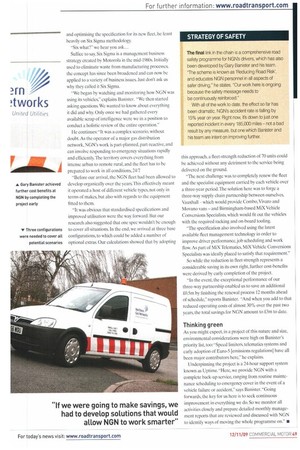Green' A
Page 48

Page 49

If you've noticed an error in this article please click here to report it so we can fix it.
van man
Credited with transforming the financial and environmental fortunes of the Northern Gas Networks fleet, United Utilities' Gary Banister is saving the green stuff in more ways than one.
Words I Images: Michael Phatips Here's a question for you: How do you reduce a fleet of 625 vans to 555? And the answer? Just take away 70.
Well, that sounds simple enough, right? But what if that fleet is committed to providing a round-the-clock, safety-critical service dedicated to protecting 2.5 million members of the general public against the potential dangers of gas? Perhaps the answer isn't quite as straightforward as you thought, after all...
Indeed, for Gary Banister, head of transport for Ti-afford Park, Manchester-based United Utilities Transport Services, solving this problem is a matter that has required four years of non-stop effort, planning and determination on the part of him and his 34-strong support team. But the medicine must have worked, because, as the project draws to a conclusion, Banister has just scooped one major industry award and is currently in the running for another.
"When we were brought in to carry out a root-andbranch reappraisal of the Northern Gas Networks (NGN) service vehicle fleet operation in 2005, safety was the primary driving factor," reveals Banister. "And while we were encouraged to seek out and implement efficiencygaining measures wherever we could, you obviously can't afford to compromise when dealing with gas "This meant we had to ensure response times and the effective operation of the fleet would either remain at its already high level or improve. Cutting for the sake of cutting was out of the question. If we were going to make savings, we had to develop solutions that would allow NGN to work smarter."
Well qualified
Banister's lengthy list of qualifications, ranging from a Masters degree in transport and distribution management to an MBA, suggests he's acquired an academic trick or two in his time. So it comes as no surprise to discover that, when it came to appraising NGN's service van operations and optimising the specification for its new fleet, he leant heavily on Six Sigma methodology.
"Six what?" we hear you ask...
Suffice to say, Six Sigma is a management business strategy created by Motorola in the mid-1980s. Initially used to eliminate waste from manufacturing processes, the concept has since been broadened and can now be applied to a variety of business issues Just don't ask us why they called it Six Sigma.
"We began by watching and monitoring how NGN was using its vehicles," explains Banister. "We then started asking questions. We wanted to know about everything it did and why. Only once we had gathered every available scrap of intelligence were we in a position to conduct a holistic review of the entire operation."
He continues: "It was a complex scenario, without doubt. As the operator of a major gas distribution network, NGN's work is part-planned, part-reactive, and can involve responding to emergency situations rapidly and efficiently. The territory covers everything from intense urban to remote rural, and the fleet has to be prepared to work in all conditions, 24/7 -Before our arrival, the NGN fleet had been allowed to develop organically over the years.This effectively meant it operated a host of different vehicle types, not only in terms of makes., but also with regards to the equipment fitted to them.
"It was obvious that standardised specifications and improved utilisation were the way forward. But our research also suggested that one spec wouldn't be enough to cover all situations. In the end, we arrived at three base configurations, to which could be added a number of optional extras. Our calculations showed that by adopting this approach, a fleet-strength reduction of 70 units could be achieved without any detriment to the service being delivered on the ground.
"The next challenge was to completely renew the fleet and the specialist equipment carried by each vehicle over a three-year period. The solution here was to forge a three-way supply chain partnership between ourselves, Vauxhall which would provide Combo, Vivaro and Movano vans and Birmingham-based MiX Vehicle Conversions Specialists, which would fit out the vehicles with the required racking and on-board tooling.
"The specification also involved using the latest available fleet management technology in order to improve driver performance, job scheduling and work flow. As part of MiX Telematics, MiX Vehicle Conversions Specialists was ideally placed to satisfy that requirement."
So while the reduction in fleet strength represents a considerable saving in its own right, further cost-benefits were derived by early completion of the project.
"In the event, the exceptional performance of our three-way partnership enabled us to save an additional £0.5m by finishing the renewal process 12 months ahead of schedule," reports Banister. "And when you add to that reduced operating costs of almost 30% over the past two years, the total savings for NGN amount to £3m to date.
Thinking green
As you might expect, in a project of this nature and size, environmental considerations were high on Banister's priority list, too: -Speed limiters, telematics systems and early adoption of Euro-5 remissions regulations] have all been major contributors here," he explains.
Underpinning the project is a 24-hour support system known as Uptime. "Here, we provide NGN with a complete back-up service, ranging from routine maintenance scheduling to emergency cover in the event of a vehicle failure or accident," says Banister. -Going forwards, the key for us here is to seek continuous improvement in everything we do. So we monitor all activities closely and prepare detailed monthly management reports that are reviewed and discussed with NON to identify ways of moving the whole programme on." •
















































































































































